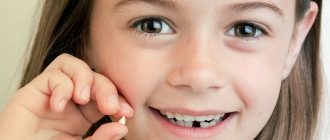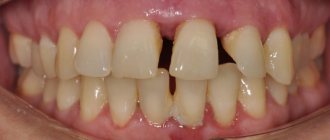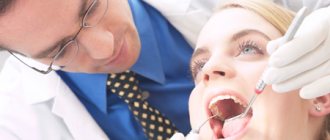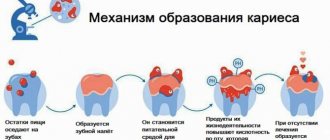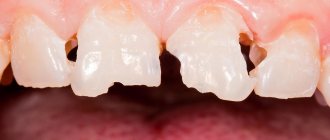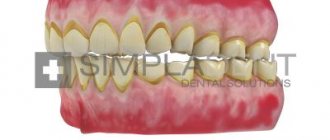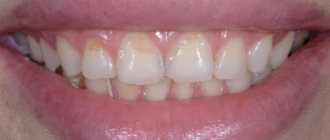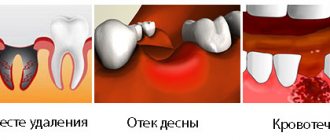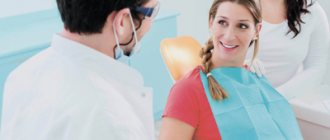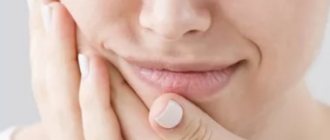What are the causes of tooth itching, what to do if the teeth of an adult and a child itch? If you know exactly what triggers the symptom and undergo all the necessary research, the doctor will be able to develop an effective treatment regimen, and as a result the patient will forget about the problem.
Knowledge about the directions of therapy at home is not enough, because it is much easier to prevent the occurrence of itching sensations, rather than trying to cope with them with medication or using traditional recipes. By following simple preventive rules, you can prevent many dental diseases.
Free consultation
Our specialists will conduct a free consultation and select the best treatment option for you.
Sign up now! Online registration
+7 (495) 649-41-19
Content
hide
1 The main causes of itchy gums and itching
2 Inflammatory processes in the gum area - another reason to think
3 Chronic inflammation in the oral mucosa
4 Itching in the gums can occur due to poor-quality prosthetics
5 Allergies - itchy gums
6 Injury to the mucous membrane
7 Itchy gums during bruxism
What diseases cause itchy gums?
Itching in the gums can be caused by diseases:
- Gingivitis. One of the symptoms of the disease is that the gums itch and hurt due to bleeding. At the first signs, you need to contact your dentist for quality treatment.
- Periodontitis. Inflammation of the gums is accompanied by itching. A periodontist can help in this situation - it is extremely important to eliminate the cause of the disease, and not its consequence.
- Stomatitis. Both adults and children are susceptible to the disease. Why do the gums itch in this case? Ulcers form on them, which cause discomfort.
- Leukoplakia. Whitish spots appear on the mucous membrane, accompanied by itching. The disease often affects smokers.
Inflammatory processes in the gum area - another reason to think
One of the main causes of itchy gums in adults is associated with chronic gingivitis. As a result, the patient may experience the following adverse events:
- Bad breath;
- Bleeding occurs during hygiene procedures;
- The appearance of redness and swelling in the gum area;
- Cyanosis.
If itching in the teeth and gums is a consequence of periodontitis, then in addition to the above symptoms, the following may occur:
- Exposure of tooth roots;
- Discharge of pus from periodontal pockets;
- The appearance of mobility of dental units.
Itchy gums with periodontitis and gingivitis. What to do?
Initially, you need to contact an experienced periodontist. Since inflammatory processes in the gum area are caused by poor oral hygiene, which results in the appearance of various deposits on the surface of the teeth and gums. This allows you to get a clear answer to the question: “Why do my gums itch, hurt and bleed?”
This means that the main treatment procedures will be aimed at removing plaque and deposits from the surface of the teeth. Subsequently, therapy is prescribed, including the use of anti-inflammatory drugs (rinsing with antiseptic solutions, gel applications, etc.). That is, if itching of the gums occurs in adults, first of all you need to eliminate the causes, and only then begin treatment. Otherwise, anti-inflammatory measures will be ineffective.
Tooth itching during pregnancy
Women expecting a baby experience a whole range of unusual and sometimes unpleasant symptoms. In more than 50% of cases, expectant mothers experience gingivitis and bleeding gums. This is due to both changes in hormonal levels and a lack of certain substances in the body (for example, calcium), which in large quantities are used to ensure the normal functioning of the fetus in the womb. The enamel and hard tissues become thinner, and hyperesthesia appears.
Sometimes the symptom is associated with emotional stress. A pregnant woman is very worried about her baby, and constant stress, as we know, does not entail anything good. As a result, pathological processes such as caries, periodontitis, and pulpitis are diagnosed.
Every woman during pregnancy should be checked by a dentist. In no case should oral diseases be ignored and therapy avoided. There are many safe but effective interventions that do not harm the child.
Chronic inflammation in the oral mucosa
When a person has itchy gums, the reasons may be hidden in inflammatory processes that occur in the mucous membrane area. This is the second most important factor that explains why gums itch. This phenomenon is especially typical for smokers. The most common diseases of the oral mucosa include:
- Aphthous and herpetic stomatitis;
- Candidiasis and leukoplakia.
To exclude this process, you should periodically pay attention to the condition of the mucous membranes of the tongue and mouth. If you notice any blisters, spots or other rashes in the oral cavity, this indicates the presence of the above disease. Seeing a doctor is a prerequisite for recovery in this case.
It must be taken into account that the source of inflammation may be in visually inaccessible areas. Please note that when your gums are itchy, this may be a sign of cancer.
Itchy teeth - what to do
The fight against symptoms involves the use of not only pharmaceutical drugs, but also traditional methods, if it is not pronounced and is not caused by serious systemic pathologies. For this reason, it is first recommended to consult a therapist, dentist or other specialist.
Mild inflammatory processes can often be relieved with herbal decoctions based on chamomile, oak bark and other natural ingredients. Some patients prefer rinsing with a simple water solution of soda and salt. The number of ingredients, proportions and dosages should be advised by a physician.
Drug treatment
Medicines are prescribed exclusively by a doctor. Self-medication is strictly contraindicated. If you try to solve the problem yourself, the risk of complications and a significant deterioration in well-being increases.
Medical tactics are directly dependent on the diagnosis:
- For allergic reactions, antihistamines are indicated. However, it is first important to identify the true allergen and get rid of it, eliminating contacts.
- Sedative medications are prescribed for prolonged stress and nervous exhaustion.
- When a fungus appears (for example, with candidiasis), the affected surfaces are treated with antiseptics, and antifungal creams and tablets are used internally or externally.
- For stomatitis, antiviral medications cannot be avoided.
- At the beginning of the inflammatory process, plaque, stone, food debris, and purulent discharge are removed from the teeth in advance. Only after high-quality professional cleaning is it possible to treat with antiseptic solutions and take non-steroidal drugs.
- If the symptom is caused by ARVI or a cold, it is worth acting on the main lesion. After it is eliminated, the swelling and itching sensations will go away on their own.
- When, due to an unpleasant manifestation, it is impossible to sleep normally and lead a normal lifestyle, decongestant gels and ointments with a mild analgesic effect are prescribed (Metrogil Denta, Cholisal, etc.).
Preventing itching
By following medical recommendations, you can forget about the problem for a long time, even if it has already arisen. To prevent a pathological condition, it is necessary to take good care of the teeth and mucous membranes, eat right, lead a healthy lifestyle, treat dental diseases in a timely manner, and worry less. Infants and pregnant women, who are most susceptible to diseases due to insufficiently strong immunity and hormonal characteristics, deserve special attention.
Itching in the gums can occur due to poor-quality prosthetics
If removable dentures are installed, the cause of discomfort may be allergization of the body. This is due to the presence of a monomer in the prosthesis, which can cause an allergic reaction.
If your gums and teeth itch after fixing bridges and crowns, this may be due to galvanosis of the oral cavity. This may be due to the use of crowns made of a variety of metals. In such situations, both artificial boxes and removable structures must be urgently replaced.
Itching after tooth extraction
If the tooth could not be saved and it became necessary to remove it, gum damage occurs at the site of the operation. The wound, as a rule, heals on its own at home: it heals over time, and the gum surface is leveled.
Itching after tooth extraction may be associated with infection, in which case the following may occur:
- pain;
- edema;
- bleeding;
- impurities of pus;
- feverish conditions;
- deterioration in general health.
This happens if the doctor, after extracting the tooth, did not properly process the edges of the socket.
Other reasons for the appearance of itching after extraction include: a nerve was touched by the doctor during the operation, or there was an incompletely removed tooth bone.
Our clinics
Clinic "Elident" on Varshavskaya
Varshavskoe highway, 75, bldg. 1, Moscow 117556
- Varshavskaya (500 m, closed until 2021)
- Nakhimovsky Prospekt (1,300 m)
Mon-Sat : 09:00-21:00; Sun : 09:00-19:00.
Online registration
+7 (495) 649-41-19
Elident Clinic in Annino
Varshavskoe highway, 154, building 1, Moscow 117405
- Annino (500 m)
- Academician Yangelya (700 m)
Mon-Sat : 09:00-21:00; Sun : 09:00-19:00.
Online registration
+7 (495) 649-41-19
Prevention
To prevent possible dental problems, doctors recommend adhering to the following rules on an ongoing basis:
- Rinse regularly with clean water, special oral care products or herbal decoctions. This is especially important to do after each meal.
- Brush your teeth twice a day, remove plaque from your tongue and the inside of your cheeks.
- Use only high-quality toothbrushes and toothpastes for this.
- Vary your diet with firm and fresh fruits and vegetables.
- Try to consume sugar-containing foods as little as possible.
- Avoid mechanical injuries to soft tissues.
- Have your teeth examined and professionally cleaned by your dentist periodically.
Allergy - itchy gums
If a person says that his gums are very itchy, this is not always evidence of a serious illness. A similar process can occur when taking any food products (chocolate, dyes, citrus fruits, spices, honey, etc.), or as a side effect when using toothpaste. In this case, it is better to stop consuming allergens or replace the toothpaste.
Often, an adult's gums itch when taking certain medications in contact with the mucous membrane. This is due to the rapid entry of mediators and allergens into the blood.
Itchy gums: other reasons
- Bruxism in adults is a disease that occurs in approximately 15% of adults, and many do not even suspect that there is something wrong with them. Jaw clenching occurs during sleep, so not everyone knows that something is wrong with it. Bruxism is much more common in children than in adults: approximately 50% of children under 7 years old grind their teeth in their sleep. Due to clenching of the jaws, the teeth experience severe overload, so the gums recede, exposing the roots. After identifying the disease, you should consult an orthopedic doctor who will make special mouthguards that can reduce the traumatic load. They do not need to be worn all the time, wearing them only during sleep, when it is impossible to control the clenching of the jaws. The causes of bruxism can be very different: prolonged stress and nervous overstrain, sleep disturbances and changes in its depth, malfunction of the nervous system, damage to the trigeminal nerve, osteochondrosis, malocclusion, trauma during childbirth and much more. Unfortunately, doctors have not yet been able to establish what exactly provokes the development of the disease. In addition to putting on mouthguards, we can recommend the following: try to relax as much as possible before going to bed; give your jaws a load during the day, trying to make them tired (you can chew hard vegetables and fruits).
- Poor quality dentures. If the dentures are removable, then the cause of the itching may be an allergy caused by failure to comply with certain parameters during the manufacture of the structure. As a rule, an excess of monomer provokes allergies. If bridges or crowns are installed, the cause of itching may be galvanosis resulting from the use of dissimilar metals (for example, people with stamped crowns often complain of itching). In both cases, the prosthesis must be replaced.
- Allergy. Each body can react differently to the same foods. The main “edible” sources of allergies are various preservatives, dyes, honey, fruits and vegetables, all kinds of spices and food additives. Quite rare, but allergic reactions to some component of the toothpaste do occur. The best way to deal with allergies is to remove the component that causes it, however, it is quite difficult to find out what exactly the body does not like. In addition, gums can itch due to an allergy to some medication taken orally and not in direct contact with the mucous membrane. Allergens are still carried through the bloodstream throughout the body.
- Damage to the mucous membrane. Traumatic injury results in an open wound that may become itchy during the healing process.
Itchy gums with bruxism
Sometimes the gums become itchy between the teeth due to bruxism. This is due to increased stress on the teeth, which results in receding gums and exposure of the roots of the teeth.
To the question: “What to do if an adult’s gums itch during bruxism?”, one can answer unequivocally: “Immediately contact an orthopedic dentist and have mouth guards installed.” These mouth guards are worn before bed to reduce dental trauma.
Article expert (author):
Drug treatment
For home treatment of itching in teeth, the dentist prescribes local and systemic drugs, which are selected separately for each clinical case. Among them may be the following medicinal groups:
- NSAIDs. These drugs suppress the activity of the inflammatory process and relieve pain (Nise, Ibuprofen, Nimesil, etc.).
- Antiseptics. Drugs in this group cause the death of a wide range of microorganisms responsible for many dental diseases (furacilin, chlorhexidine, hydrogen peroxide, etc.).
- Antimicrobial. These drugs act on bacterial infections and are prescribed for diseases of bacterial origin (Metrogil-Denta, Solcoseryl, etc.).
- Antibiotics. These agents have a detrimental effect on pathogenic bacteria and are selected taking into account the sensitivity of the pathogen to a particular active substance (Lincomycin, Ciprofloxacin, Amoxilav, etc.).
- Antihistamines. These drugs reduce the sensitivity of the immune system, which exhibits a hyperreaction to any safe substances (Suprastin, Tavegil, Clemastine, etc.).
Read also: Toothache when pressing on a tooth
How to relieve itching using traditional methods
An unpleasant symptom can be localized and stopped using proven simple methods. They are based on natural ingredients that have a beneficial effect on the cleanliness and health of the oral mucosa. If your gums become red and itchy, it is better to use a soda solution as first aid at the rate of 1 spoon per 1 glass of warm water. Other options that are no less easy to prepare:
- Decoctions of sage herbs, oak bark, chamomile, plantain, eucalyptus leaves, calamus root, thyme or golden mustache. They can be used in any combination, brewing with boiling water or in a water bath, infusing in a regular thermos.
- Sea buckthorn, laurel, tea tree or black cumin seed oils. They are rubbed into itchy areas of the gums 2-3 times a day.
- Mix a spoonful of soda and salt in a glass, add hot water, and stir thoroughly. The resulting liquid is kept in the mouth for 5-8 minutes every 2 hours.
- Add 10-15 drops of alcohol-based calendula to warm water for rinsing.
- The mucous membrane is lubricated with fresh aloe juice. It is squeezed out of the torn leaf immediately before the procedure.
How to relieve itchy gums should be decided by a specialist. Many painful and inflamed areas are located in places that cannot be seen on your own. Therefore, delaying treatment can lead to serious complications.
When asked what to do when your teeth itch very much, without thinking for a long time, they give the obvious answer: “You need to give a rubber ring.” It’s your baby’s teeth growing.” Yes, with children the problem is easily solved. What to do if an adult’s teeth begin to itch? This situation also occurs.
Of course, it would be more correct to say that the gums itch, but sometimes the sensation is so strong that it really seems like the bone formations themselves are itching. Why does this happen and how to get rid of the unpleasant feeling?
Symptoms of sore gums
Each child experiences teething differently. The most characteristic symptoms are:
- inflammation of the gum tissue, itchy condition;
- excessive secretion of saliva (the mucous membrane secretes biological fluid to protect the inflamed area from greater damage);
- capricious behavior (the baby cries due to obvious discomfort in the oral cavity);
- disruption of the normal nature of sleep.
Other symptoms that are less common, but also characteristic of teething, are:
- increased body temperature;
- headache;
- intestinal problems (diarrhea, constipation);
- nausea, vomiting;
- difficulty breathing;
- cough.
Such conditions of the baby can seriously frighten parents. The best way out of the situation is to visit a pediatrician. In this case, a comprehensive examination of the child will be carried out, an accurate diagnosis will be made, and the medications required to be taken will be prescribed.
Preventive actions
As preventive measures, it is recommended to exclude yeast and sweet products, add vegetables and fruits to the diet, use high-quality cleansing paste (with calcium and fluoride), brushes, and use dental floss.
The temperature of food consumed should be no more than 36 degrees. You should also regularly brush your teeth, tongue and gums, and rinse your mouth with a solution of salt, herbs or clean water.
Itching is one of the most unpleasant symptoms that can manifest itself not only on the skin, but, oddly enough, on the teeth. This phenomenon is observed quite often in dentistry. In fact, sensations are deceiving; the gum tissues around the teeth and mucous membranes itch. The nature of the appearance of itching on dental elements is very diverse, so each of the reasons must be considered in more detail.
Adults' teeth itch: causes and methods of elimination

